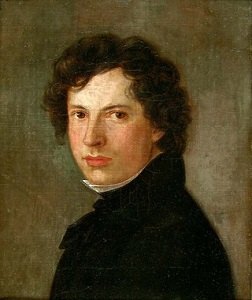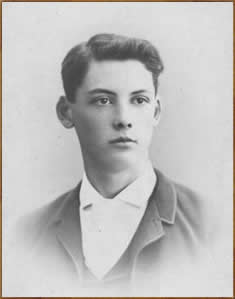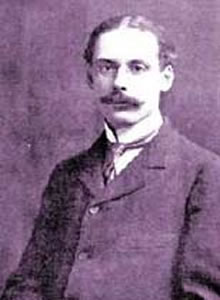De Nederlandse schrijfster Lulu Wang werd geboren op 22 december 1960 in Beijing. Zie ook alle tags voor Lulu Wang op dit blog.
Uit: Heldere maan
“Jian daalt. Naar het dal onder zijn ledematen, die, wijd gespreid, samen met zijn hoofd een da – het Chinese karakter voor ‘groot’ – afbeelden. Zijn oren scheren langs de ongerepte lucht boven het subtropische oerwoud. Een ogenblik geleden stond hij nog met zijn pas afgestudeerde vrienden op een rots van de Emei-berg te glunderen en nu is hij hard op weg naar… Een videoclip wordt voor zijn ogen in versneld tempo afgespeeld. Zijn moeder die de vogelnestsoep op smaak brengt met haar zoutige tranen. Zijn vader die als een afgepeigerde beer op de bank zakt, áls hij al thuiskomt. Zijn vriendin die zijn ouders de mantel uitveegt. Zijn dienstmeisje en haar… Herinneringen die hij vroeger kon missen als kiespijn worden hem ineens dierbaar.
De kap van torenhoge bamboe, waarop Jian terecht is gekomen, buigt zich. Zijn handen kunnen bijna de varens op de grond raken. De bamboe veert terug, waardoor hij opnieuw halverwege tussen hemel en aarde hangt. De stam waar hij zich aan vastklampt, maakt een krakend geluid, kan elk ogenblik terugveren en hem als een pingpongbal naar het ravijn aan de overkant serveren. Pijnscheuten dreigen zijn bekken zodanig in splinters te splijten dat hij in plaats van bang te zijn voor de dood, ernaar verlangt.
Het sissen van, halt, het kruipen van een slang tussen het hoge gras! Jian ziet een bamboegroene, met dezelfde kleur en hetzelfde motief als de stam die hem voorlopig in leven houdt. De lange, smalle tong van het gifspuiende beest raast als een laserstraal op Jians keel af. Ineens keert de drang om te overleven bij hem terug. Hij ontwijkt, zo goed en zo kwaad als het gaat, het bloedlinke dier – dat Satan in de gedaante van een slang verschijnt, zal wel geen toeval zijn –, maar in zijn achterhoofd schemert het besef dat dat gelijk staat aan een rivier met een zwaard af te hakken – onbegonnen werk. Hij kijkt weg van de kronkelende aanjager van zijn ophanden zijnde einde en ontdekt opeens vijf meisjesvingers. Fris en haast doorzichtig als gepelde bamboescheuten, betasten ze een bloeiend plantje, trekken het uit de aarde en schudden de modder eraf.”

Lulu Wang (Beijing, 22 december 1960)
De Zwitserse schrijver Christoph Keller werd geboren op 22 december 1963 in St. Gallen. Zie ook alle tags voor Christoph Keller op dit blog.
Uit: A second story
“He had dragged the root to his living room, to the annoyance of his wife. For weeks bugs and ants had crawled around their apartment, trying to find their way back to the woods. The Ritual showed Pentagrass in an undershirt (the one Johan was wearing now) and suspenders from the back, holding the roots in midair with the help of a rope while a woman is watching disapprovingly. (The woman in his real life came to appreciate the painting.) He looked at Johan intensely. Like an actor who knew his role but not the movie he was in, Johan knew what to wear and where to stand, but he didn’t know anything else. He didn’t know what to expect, if anything. He certainly didn’t know that Pentagrass felt forced to come back to the scene of crime of his previous painting. Johan didn’t know that Pentagrass felt mysteriously compelled to paint another angel painting after Make / Believe and Making Sky. It didn’t occur to him that he could become part of the painting, with maybe no way out. He had been told to look surprised but he didn’t know that his surprise would be genuine. Quickly, Pentagrass stepped into the scene, put a crown of feathers into the still-open hole, and withdrew.
Johan felt sick, falling apart. He felt it physically, cheeks narrowing and paling, blood thickening, heartbeat slowing. Was he out of work by now? He couldn’t check the time, not while posing. It must be past four, the restaurant had opened, and his, and the pick-up’s, absence noticed. He glanced at Pentagrass, who nodded: that was a violation of the rules! Ligh t— a geyser of light — shot out of the hole, and it filled with feathers, white as those of a goose, a swan. Johan did what people often do when they don’t understand—he went on a search for his cigarettes. He didn’t care about abandoning his pose, even leaving the scene. He found them on the passenger’s seat. The car smelled of age and abuse. Back at the hole, it felt inappropriate to light up.”
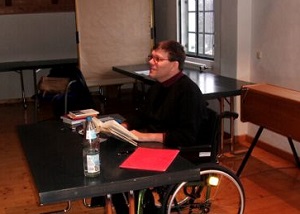
Christoph Keller (St. Gallen, 22 december 1963)
De Noorse dichter en criticus Johan Sebastian Welhaven werd op 22 december 1807 in Bergen geboren. Zie ook alle tags voor Johan Sebastian Welhaven op dit blog.
The Wild Hunt (Fragment)
The third night, -when the beer was consumed
through all the holidays – by old and young,
Then thirst in the party was stopped,
But the men were drunken and slow.
Our bride wore her crown…
It was time for the bowl to be sent round the table
And the toastmaster demanded silence
with a knock on the table, – and started his speech.
Then charging in on the benched circle
the widely infamous Seim’s Berserks,
Their eyes were rolling dark and wild
On their foreheads they had scars from fighting.
They leaped over the floor of the hall,
-Yes! It was the brothers Grim and Wolf!
Grim, who was recently turned down by the bride
Came there himself, – and he was not invited.
The sleepy guests got up shaking
And had little desire for fighting.
Every raving man who raised his fist
Was grabbed by the chest and thrown aside.
The groom placed his mug down on the table
Stepped up on the bench and asked for peace.
But the brothers already took out their knives,
– It was the groom’s life it was all about.
Vertaald door Liv Wenger
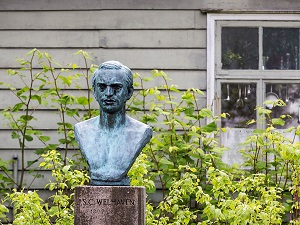
Johan Sebastian Welhaven (22 december 1807 – 21 oktober 1873)
Borstbeeld in Bergen, Noorwegen
De Zwitserse schrijver Ulrich Bräker werd geboren op 22 december 1735 in Näppis (Scheftenau), Toggenburg, Kanton St. Gallen. Zie ook alle tags voor Ulrich Bäker op dit blog.
Uit: Lebensgeschichte und Natürliche Ebentheuer des Armen Mannes im Tockenburg
„Ich bin in meinen Kinderjahren nur wenige Wochen in die Schule gegangen; bey Haus hingegen mangelte es mir gar nicht an Lust, mich in mancherley unterweisen zu lassen. Das Auswendiglernen gab mir wenig Müh: Besonders übt’ ich mich fleißig in der Bibel; konnte viele darinn enthaltene Geschichten aus dem Stegreif erzählen, und gab sonst überhaupt auf alles Achtung, was mein Wissen vermehren konnte. Mein Vater las’ auch gern etwas Historisches oder Mystisches. Gerad um diese Zeit gieng ein Buch aus, der flüchtige Pater genannt. Er und unser Nachbar Hans vertrieben sich manche liebe Stunde damit, und glaubten an den darinn prophezeyten Fall des Antichrists, und die dem End der Welt vorgehnden nahen Strafgerichte, wie an’s Evangelium. Auch Ich las viel darinn; predigte etlichen unsrer Nachbarn mit einer ängstlich andächtigen Miene, die Hand vor die Stirn gestemmt, halbe Abende aus dem Pater vor, und gab ihnen alles vor baare Münz aus; und dieß nach meiner eignen völligsten Ueberzeugung. Mir stieg nur kein Gedanke auf, daß ein Mensch ein Buch schreiben könnte, worinn nicht alles pur lautere Wahrheit wäre; und da mein Vater und der Hans nicht daran zweifelten, schien mir alles vollends Ja und Amen zu seyn. Aber das brachte mich dann eben auf allerley jammerhafte Vorstellungen. Ich wollte mich gern auf den bevorstehnden Jüngsten Tag recht zubereiten; allein da fand ich entsetzliche Schwierigkeiten, nicht so fast in einem bösen Thun und Lassen, als in meinem oft argen Sinn und Denken. Dann wollt ich mir wieder Alles aus dem Kopf schlagen; aber vergebens, wenn ich zumal unterweilen auch in der Offenbarung Johannis oder im Propheten Daniel las, so schien mir alles das, was der Pater schrieb, vollends gewiß und unfehlbar. Und was das Schlimmste war, so verlor ich ob dieser Ueberzeugung gar alle Freud’ und Muth. Wenn ich dann im Gegentheil den Aeti und den Nachbar fast noch fröhlicher sah als zuvor, machte mich solches gar confus; und kann ich mir’s noch itzund nicht erklären, wie das zugieng. So viel weiß ich wohl, sie steckten damals beyde in schweren Schulden, und hoften vielleicht durch das End der Welt davon befreyt zu werden: Wenigstens hört’ ich sie oft vom Neufunden Land, Carolina, Pensylvani und Virgini sprechen; ein andermal überhaupt von einer Flucht, vom Auszug aus Babel, von den Reisekosten u.dgl. Da spitzt ich dann die Ohren wie ein Haas.“
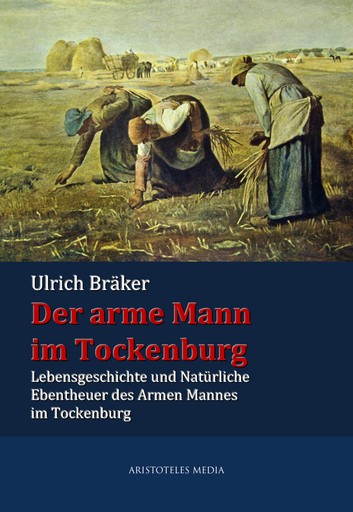
Ulrich Bräker (22 december 1735 – (begraven) 11 september 1798)
Cover
De Duitse schrijver Rudolf Krämer-Badoni werd geboren op 22 december 1913 in Rüdesheim als Rudolf Kramer. Zie ook alle tags voor Rudolf Krämer-Badoni op dit blog.
Uit: Judenmord, Frauenmord, Heilige Kirche
„Sie waren Juden und besaßen das Privileg aller anderen Juden: Sie waren vom Kaiserkult befreit. Alle Juden stritten untereinander über ihre vielen Religionsgesetze, das waren die Römer gewöhnt. Sie bemerkten keinen Unterschied zwischen Jude und Jude.
Das wurde anders, als Paulus in Rom auftrat. Er hatte der römischen Gemeinde, die nicht von ihm, sondern von Jerusalemer Judenchristen gegründet war, einen schönen Brief geschrieben mit vielen freundlichen Worten über die Juden. Gewiß, er hatte darin auch den zornigen David zitiert: »Ihr Tisch soll ihnen zur Schlinge und Falle und Vergeltung werden, und ihre Augen blind und ihr Rücken ewig krumm«, aber dann doch auch dies: »Die Verstocktheit eines Teils der Israeliten dauert so lange, bis die Vollzahl der Heiden erreicht ist. Dann wird ganz Israel gerettet werden.« Er hatte den Brief geschrieben, um für seinen Besuch in der Reichshauptstadt eine freundliche Stimmung vorzubereiten.
Doch in Jerusalem geriet er plötzlich in Gefangenschaft, und nun kommt er ganz anders nach Rom: in Fesseln. Im Hausarrest wartet er auf seinen Appellationsprozeß.
Und so lernten sie einander kennen, der Briefschreiber und die Briefempfänger. Er empfängt Besuche, er lehrt, er hat Erfolge, allerdings »predigen einige Christus aus Neid und Eifersucht, doch was liegt daran, wenn nur auf alle Weise, ob aufrichtig oder mit Nebengedanken, Christus verkündigt wird« (Phil 1,15f). Und: »Ich habe sonst keinen, der ihm [Timotheus] gleichgesinnt ist. Alle anderen denken an sich, nicht an die Sache Christi« (Phil 2,20f). Und am Schluß des Philipperbriefs: »Es grüßen euch alle Heiligen, besonders die vom Hofe des Kaisers.«
Was ist geschehen? Hat ihn die römische judenchristliche Gemeinde nicht gut aufgenommen? Nicht nur das, sie hat sich sogar gänzlich von ihm zurückgezogen. Am Ende des Kolosserbriefes steht es: »Aristarch, Markus, Jesus Justus, das sind die einzigen aus dem Judentum, die mir als Mitarbeiter geblieben sind.”
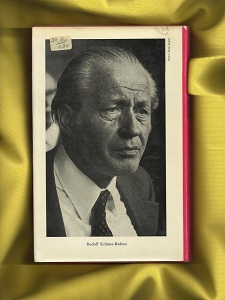
Rudolf Krämer-Badoni (22 december 1913 – 18 september 1989)
De Amerikaanse schrijver en strijder tegen slavernij Thomas Wentworth Higginson werd geboren op 22 december 1823 in Cambridge, Massachusetts. Zie ook alle tags voor Thomas Higginson op dit blog.
Uit: The Complete Civil War Journal and Selected Letters
“My housekeeping at home is not perhaps on any very extravagant scale. Buying beefsteak, I usually go to the extent of two pounds. Yet when this morning the Quartermaster inquired how many cattle I wished to have killed for roasting I answered composedly “Ten, & keep three to be fatted.” Fatted, quotha—Not one of the beasts has one ounce of superfluous flesh. Never was seen such lean kine. As they swing on vast spits, composed of young trees, the fire light glimmers through their ribs, lantern like. But they are cooking, nay are cooked. One at least is taken off to cool & will be replaced tomorrow to warm up. It was cooked three hours & well done, for I tasted it. It is so long since I tasted fresh beef that I may have forgotten; but I fancied this to be successful. I tried to fancy that I liked the Homeric repast; certainly it was all far more agreeable than I expected. The doubt now is, whether I have made sufficient provision for my family; I should have roughly guessed that ten beeves would feed as many million people it has such a stupendous sound; but Gen. Saxton’s estimate for tomorrow is 5,000. & we fear meat will run short, unless they prefer bone. One of the cattle is so small, I am hoping it may turn out veal.
For drink we aim at the simple luxury of molasses & water, a barrel per company. Liberal housekeepers may like to know that for a barrel of water is allowed three gallons of molasses, half a pound of ginger & a quart of vinegar, this last being a new ingredient for my untutored palate though the rest are amazed at my ignorance. Hard bread with more molasses, with subsequent tobacco, complete the repast destined to cheer but not inebriate.
On this last point, of inebriation, this is certainly a wonderful camp. For us it is absolutely omitted from the list of vices. I have never heard of a glass of liquor in the camp nor of any effort to keep it out. A total absence of the circulating medium might explain the abstinence, but not the non allusion to the subject. The craving for tobacco is hourly and constant, like that of a mother for her children; but I have never heard whiskey even wished for, save on Christmas Day, & then only with a hopeless far off sighing as you on that day might have visions of strawberries. I am amazed at this total omission of the most inconvenient of all camp-appetites.”
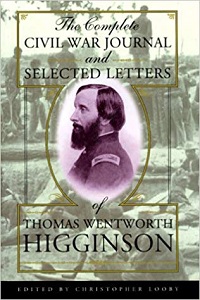
Thomas Higginson (22 december 1823 – 9 mei 1911)
Cover

